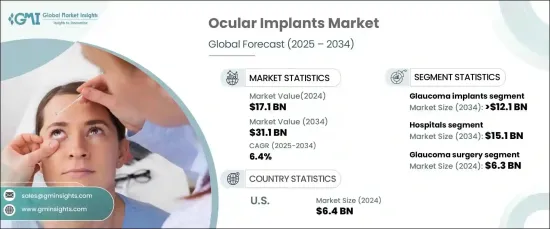
2024년에 171억 달러로 평가된 안구 임플란트 세계 시장은 2025-2034년에 걸쳐 CAGR 6.4%로 강력한 성장을 이룰 전망입니다.
이러한 눈부신 확대에는 심미성 향상에 대한 수요 증가, 저침습수술의 인기 증가, 의료 지출 급증, 고급 눈 건강관리 솔루션이 필요한 고령화 인구 증가 등 여러 요인이 기여하고 있습니다. 또한 녹내장 및 백내장과 같은 만성 안질환의 급증과 시력 교정 치료에 대한 의식 증가가 안구 임플란트의 채용을 더욱 뒷받침하고 있습니다. 또한 임플란트 재료 및 디자인의 혁신은 환자의 예후 개선과 안전성 향상을 보장하고 시장 성장에 기여합니다.

시장은 녹내장 임플란트, 안구 렌즈, 안와 임플란트, 안구 보철물 및 기타 관련 제품으로 분류됩니다. 그 중에서도 녹내장 임플란트 부문은 두드러진 성장세를 보이고 있으며 CAGR 6.2%로 성장하여 2034년에는 121억 달러에 달할 것으로 예상되고 있습니다. 이 성장의 주요 원인으로는 특히 노인층에서 녹내장의 유병률이 증가하면서 안압(IOP)을 관리하기 위한 효과적인 솔루션에 대한 수요 증가를 들 수 있습니다. 결과적으로 녹내장 임플란트는 환자의 삶의 질을 향상시키고 더 나은 안압 조절과 합병증 감소 능력을 제공하는 중요한 요소가 되고 있습니다.
| 시장 범위 | |
|---|---|
| 시작년 | 2024년 |
| 예측연도 | 2025-2034년 |
| 시작금액 | 171억 달러 |
| 예측금액 | 311억 달러 |
| CAGR | 6.4% |
용도별로 볼 때, 안구 임플란트 시장은 노화 황반 변성, 녹내장 수술, 약물 전달, 눈 성형, 미용 목적으로 구분됩니다. 녹내장 수술 부문은 2024년 63억 달러로 평가되었으며 2034년까지 연평균 복합 성장률(CAGR) 6.7%로 성장할 것으로 예상됩니다. 녹내장 임플란트 수요는 작고 효과적이며 침습성이 낮은 옵션을 포함한 임플란트 디자인의 진보로 견인되었습니다. 이러한 혁신은 안전성, 생체적합성 및 전반적인 치료 효과를 향상시키면서 환자와 의료 제공업체 모두에게 인기를 끌고 있습니다.
미국의 안구 임플란트 시장은 2024년에 64억 달러로 평가되었고 2025-2034년에 걸쳐 CAGR 6.1%를 나타낼 것으로 예측됩니다. 이 나라에는 백내장, 녹내장, 당뇨병성 망막증, 황반 변성 등 노화에 따른 다양한 안질환을 가진 고령화된 인구가 많습니다. 노인 수가 계속 증가하고 만성 안질환의 발병률이 증가함에 따라 시력 교정 및 고안압 관리에 대응하는 첨단 안구 임플란트 수요가 증가하고 있습니다. 이러한 수요의 급증은 미국 시장의 상당한 성장을 이끌고 있으며, 의료 진보는 환자의 진화하는 요구에 부응하는 데 중요한 역할을 하고 있습니다.
The Global Ocular Implants Market, valued at USD 17.1 billion in 2024, is set for robust growth at a CAGR of 6.4% from 2025 to 2034. This impressive expansion is fueled by multiple factors, including the increasing demand for aesthetic enhancements, the rising popularity of minimally invasive procedures, escalating healthcare spending, and a growing aging population in need of advanced eye care solutions. Additionally, the surge in chronic eye diseases, such as glaucoma and cataracts, along with rising awareness about vision correction treatments, is further driving the adoption of ocular implants. Technological innovations in implant materials and designs also contribute to the market's growth, ensuring better patient outcomes and increased safety.

The market is categorized into glaucoma implants, intraocular lenses, orbital implants, ocular prostheses, and other related products. Among these, the glaucoma implants segment stands out, expected to achieve a CAGR of 6.2% and reach USD 12.1 billion by 2034. This growth is primarily driven by the rising prevalence of glaucoma, especially among older populations, highlighting the increasing demand for effective solutions to manage intraocular pressure (IOP). As a result, glaucoma implants are becoming a critical component in improving the quality of life for patients, offering better IOP control and fewer complications.
| Market Scope | |
|---|---|
| Start Year | 2024 |
| Forecast Year | 2025-2034 |
| Start Value | $17.1 Billion |
| Forecast Value | $31.1 Billion |
| CAGR | 6.4% |
Focusing on applications, the ocular implants market is segmented into age-related macular degeneration, glaucoma surgery, drug delivery, oculoplasty, and aesthetic purposes. The glaucoma surgery segment, valued at USD 6.3 billion in 2024, is expected to grow at a CAGR of 6.7% by 2034. The demand for glaucoma implants is driven by advancements in implant design, which include smaller, more effective, and minimally invasive options. These innovations enhance safety, biocompatibility, and overall treatment effectiveness, making them more popular among both patients and healthcare providers.
The U.S. ocular implants market, valued at USD 6.4 billion in 2024, is projected to grow at a CAGR of 6.1% during 2025-2034. The country has a large and aging population dealing with various age-related eye conditions, including cataracts, glaucoma, diabetic retinopathy, and macular degeneration. As the elderly population continues to grow and the incidence of chronic eye diseases rises, the demand for advanced ocular implants to address vision correction and manage high intraocular pressure continues to increase. This surge in demand is driving significant growth in the U.S. market, with healthcare advancements playing a crucial role in meeting the evolving needs of patients.